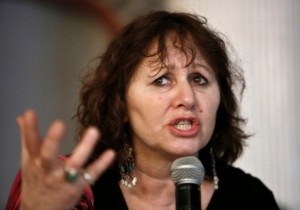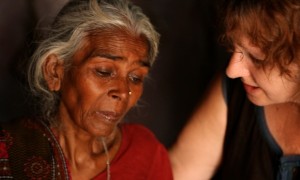Delhi rape documentary-maker appeals to Narendra Modi over broadcast ban
India’s Daughter director Leslee Udwin appeals to Indian PM to deal with ‘unceremonious silencing of the film’

British filmmaker Leslee Udwin addresses a press conference.
British filmmaker Leslee Udwin addresses a press conference. Photograph: Anindito Mukherjee/Reuters
Maseeh Rahman in Delhi and Tara Conlan in London
The British director of a hard-hitting documentary about the gang rape of a young woman in Delhi has appealed to the Indian prime minister, Narendra Modi, to intervene after authorities banned the domestic broadcast of the film and said they were also trying to prevent it from being shown worldwide.
Leslee Udwin, whose documentary India’s Daughter was originally scheduled to be broadcast internationally on Sunday and was brought forward to Wednesday night, made an emotional plea to Modi “to deal with this unceremonious silencing of the film” in India.
India’s Daughter: ‘I made a film on rape in India. Men’s brutal attitudes truly shocked me’
Shortly before her statement was released, the parliamentary affairs minister, M Venkaiah Naidu, declared: “We can ban the film in India. But this is an international conspiracy to defame India. We will see how the film can be stopped abroad too.”
Based on the brutal rape in December 2012 of 23-year-old physiotherapy student Jyoti Singh, Udwin’s documentary includes interviews with one of the men convicted for the crime, who is now in prison in Delhi and waiting for the supreme court to hear his appeal against the death sentence.
In it, Mukesh Singh suggests his victim would not have been killed if she had not fought back against her attackers. He appears to blame her for not behaving like “a decent girl”.
In her appeal on Wednesday, Udwin said: “India should be embracing this film – not blocking it with a kneejerk hysteria without even seeing it. This was an opportunity for India to continue to show the world how much has changed since this heinous crime. Sadly … the banning of the film will see India isolated in the eyes of the world. It’s a counterproductive move.”
“Whoever is behind this – please see the film and then come to a conclusion.”

Film-maker Leslee Udwin meets the mother of convicted rapist Mukesh Singh.
Film-maker Leslee Udwin meets the mother of convicted rapist Mukesh Singh. Photograph: PR
India’s home minister, Rajnath Singh, told parliament that the government would ensure that “under no condition should this documentary be telecast … no one should show it on electronic media.”
The government would also block the dissemination of the film on any other platform, such as a web portal or on social media, he said.
Singh assured parliament that the Indian government was already exploring ways of stopping the worldwide broadcast. A notice had been sent to BBC4, which will show the film on Sunday in Britain, he said. “We will not allow anyone to leverage such unfortunate incidents [the 2012 Delhi rape] for commercial benefits,” he added.
However, a BBC spokeswoman confirmed that India’s Daughter would be broadcast as planned. “This harrowing documentary, made with the full support and cooperation of the victim’s parents, provides a revealing insight into a horrific crime that sent shockwaves around the world and led to protests across India demanding changes in attitudes towards women,” she said.
“The film handles the issue responsibly and we are confident the programme fully complies with our editorial guidelines. The BBC will broadcast Storyville – India’s Daughter, in the UK on BBC4. The documentary has the backing of a number other public service broadcasters; however, the BBC is only responsible for transmission of the film in the UK.”
The film is also due to be broadcast in Denmark, Sweden, Switzerland, Norway and Canada..
The film will also launch a worldwide campaign against sexual violence and gender inequality. In India, the campaign was to begin in schools in Maharashtra state.
Udwin described the documentary as “an impassioned plea for gender equality … This is a documentary I left my young children and the comfort of my home for, to spend two years dedicated to a crucial cause in the public interest of women, not just in India but worldwide,” she said.
The controversy over India’s Daughter has demonstrated how deeply divided India is on how to deal with violence against women.
Reducing rape to a generic Indian male mindset fails its victims
Priyamvada Gopal
The film is facing both vociferous criticism and support inside and outside parliament. “We have to confront the issue that many men in India do not respect women,” said Anu Aga, an MP and one of the country’s few top female industrialists.
“What the man [Mukesh Singh] spoke reflects the views of many men in India. Why are we shying away from that? Let’s be aware of the view and not pretend all is well.”
Sunita Krishnan, a campaigner against rape who, like Udwin, is a rape survivor, described India’s Daughter as “a mirror for introspection”.
“It’s a fact that rapist language has been heard from prominent leaders in the country also,” she said. “By exposing a criminal’s mindset you’re not glorifying a rapist. The film is a platform for collective condemnation of such mindsets.”
Support also came from celebrated Bollywood lyricist Javed Akhtar, who said: “It is good that this film was made; it will reveal how many men think like Nirbhaya’s rapist.” Nirbhaya, meaning “fearless”, is the name given to Jyoti Singh in India to conceal her real identity.
The home minister claimed that Udwin had flouted the conditions under which permission was given to interview Mukesh Singh in jail. She had not submitted the full, uncut footage of the interview for approval by jail authorities, he alleged.
But Udwin denied this. She said she had taken the full 16 hours of “raw, unedited footage” to the jail, but a three-member review committee, after watching it for three hours, told her: “We can’t sit through all this, it’s too long.”
“So I submitted an edited version which was cleared,” she said.